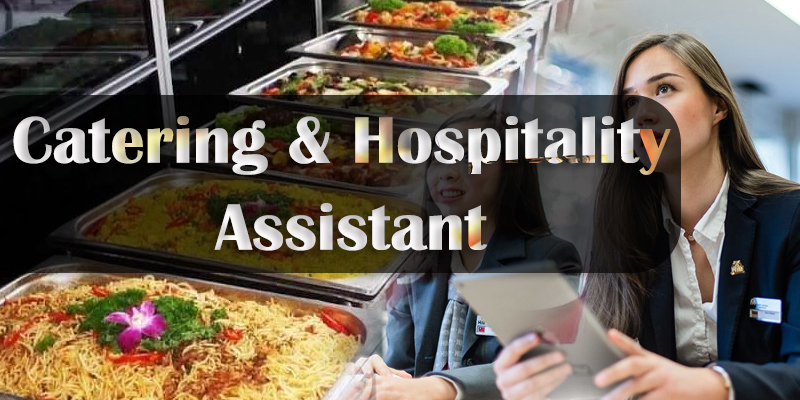
The syllabus for the ITI Trade "Catering & Hospitality Assistant" in English. This one-year course, offered under the Craftsman Training Scheme (CTS) by the National Council for Vocational Training (NCVT), trains students to assist in catering and hospitality services, including food preparation, service, and customer support in establishments like hotels, restaurants, and catering units. The syllabus includes Trade Theory, Trade Practical, Workshop Calculation and Science, Engineering Drawing, and Employability Skills. Here’s the detailed breakdown:
1. Trade Theory
This section provides theoretical knowledge about catering, hospitality, and operational management.
- Introduction to Catering and Hospitality
- Scope and importance of the trade in the hospitality industry.
- Role of a Catering & Hospitality Assistant in food service and guest care.
- Hygiene and Safety
- Personal hygiene and grooming standards.
- Kitchen and workplace sanitation practices.
- Food safety regulations and prevention of contamination.
- Use of safety equipment and first aid basics.
- Kitchen Equipment and Tools
- Types and uses of kitchen tools (e.g., knives, mixers, ovens).
- Operation and maintenance of equipment (e.g., refrigerators, stoves).
- Safety protocols for handling equipment.
- Food Preparation Basics
- Types of ingredients and their uses.
- Cooking methods: boiling, frying, baking, grilling.
- Preparation of simple dishes and beverages.
- Food and Beverage Service
- Types of service: table service, buffet, room service.
- Table setting, napkin folding, and tray arrangement.
- Beverage service: tea, coffee, soft drinks, and basic cocktails.
- Customer Service
- Importance of communication and interpersonal skills.
- Handling guest queries and complaints effectively.
- Basic etiquette and professional behavior.
- Hospitality Operations
- Overview of hotel and restaurant operations.
- Coordination between kitchen, service, and housekeeping departments.
- Basic housekeeping tasks (e.g., bed making, cleaning).
- Quality Control
- Standards for food quality and presentation.
- Identifying and addressing spoilage or substandard items.
- Entrepreneurship
- Basics of starting a small catering or hospitality business.
- Cost estimation and resource management.
2. Trade Practical
This hands-on component develops practical skills in catering and hospitality tasks.
- Hygiene Practices
- Demonstrate personal hygiene and grooming standards.
- Clean and sanitize kitchen tools, equipment, and work areas.
- Equipment Handling
- Operate kitchen appliances (e.g., ovens, blenders, refrigerators).
- Perform basic maintenance and troubleshoot minor issues.
- Food Preparation
- Prepare basic dishes: soups, salads, sandwiches, and snacks.
- Practice cooking techniques (e.g., boiling, frying, baking).
- Make hot and cold beverages (e.g., tea, coffee, juices).
- Food and Beverage Service
- Set up tables with cutlery, crockery, and napkins.
- Serve food and beverages using tray and table service methods.
- Practice room service procedures.
- Customer Interaction
- Role-play guest greeting, order-taking, and complaint resolution.
- Demonstrate polite and effective communication.
- Housekeeping Tasks
- Make beds and arrange rooms neatly.
- Clean dining and guest areas following hygiene standards.
- Project Work
- Plan and execute a small catering event (e.g., serving a group).
- Prepare a simple menu and present food with proper service.
3. Workshop Calculation and Science
This covers mathematical and scientific principles relevant to catering and hospitality.
- Calculations
- Measurements: weight, volume, and portion sizes.
- Simple cost calculations for ingredients and services.
- Science
- Basics of food preservation (e.g., refrigeration, heat effects).
- Properties of ingredients (e.g., boiling points, nutritional value).
4. Engineering Drawing
This focuses on basic technical drawing skills for layout planning.
- Drawing Basics
- Sketch simple kitchen and dining layouts.
- Draw equipment placement and table arrangements.
5. Employability Skills
This enhances professional skills for job readiness.
- Communication
- Practice verbal and written communication with guests and team.
- Workplace Skills
- Time management, teamwork, and problem-solving.
Course Overview
- Duration: 1 year (2 semesters of 6 months each)
- Eligibility: Passed 10th class examination from a recognized board.
- Objective: To train individuals in food preparation, service, hygiene, and customer interaction, preparing them for roles like Kitchen Assistant, Food Service Assistant, or Waiter/Waitress in hotels, restaurants, and catering services.
This syllabus aligns with the NCVT framework and may vary slightly by state or ITI. For the latest details, refer to the Directorate General of Training (DGT) website or local ITI resources. The course blends practical training with hospitality skills, offering a pathway to careers in the growing food and service industry. Let me know if you need specific sections (e.g., Trade Theory or Trade Practical) refined further!
Trade Type
- 4 views